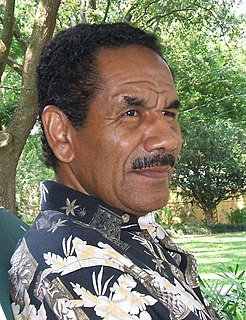A Quote by Peter Straub
Every writer must acknowledge and be able to handle the unalterable fact that he has, in effect, given himself a life sentence in solitary confinement. The ordinary world of work is closed to him - and that if he's lucky!
Related Quotes
Solitary confinement has been used extensively, it always has. I was in prison for 44 years; it was a normal part of life - the practice of it. They put you in solitary confinement for disciplinary reasons, they put you in solitary confinement to protect you from violence or whatever, and they also put you in solitary confinement just to show you who has got the power ... It's not something new; it's just something that nobody really cared about in the past.
In spite of language, in spite of intelligence and intuition and sympathy, one can never really communicate anything to anybody. The essential substance of every thought and feeling remains incommunicable, locked up in the impenetrable strong-room of the individual soul and body. Our life is a sentence of perpetual solitary confinement.
I did a lot of research on what solitary confinement does to you, how you become acclimated to being surrounded by people again after being by yourself for such a long time. It's really a horrific thing. It's definitely worth considering it as torture. We're just not meant to be in solitary confinement.
A prisoner lived in solitary confinement for years. He saw and spoke to no one and his meals were served through an opening in the wall. One day an ant came into his cell. The man contemplated it in fascination as it crawled around the room. He held it in the palm of his hand the better to observe it, gave it a grain or two, and kept it under his tin cup at night. One day it suddenly struck him that it had taken him ten long years of solitary confinement to open his eyes to the loveliness of an ant.
I thought, He must forebear to reveal His power and glory by presenting Himself as Himself, and must be present only in the ordinary miracle of the existence of His creatures. Those who wish to see Him must see Him in the poor, the hungry, the hurt, the wordless creatures, the groaning and travailing beautiful world.
Every sentence has a truth waiting at the end of it and the writer learns how to know it when he finally gets there. On one level this truth is the swing of the sentence, the beat and poise, but down deeper it's the integrity of the writer as he matches with the language. I've always seen myself in sentences. I begin to recognize myself, word by word, as I work through a sentence. The language of my books has shaped me as a man. There's a moral force in a sentence when it comes out right. It speaks the writer's will to live.
Writing is linear and sequential; Sentence B must follow Sentence A, and Sentence C must follow Sentence B, and eventually you get to Sentence Z. The hard part of writing isn't the writing; it's the thinking. You can solve most of your writing problems if you stop after every sentence and ask: What does the reader need to know next?
The writer walks out of his workroom in a daze. He wants a drink. He needs it. It happens to be a fact that nearly every writer of fiction in the world drinks more whisky than is good for him. He does it to give himself faith hope and courage. A person is a fool to become a writer. His only compensation is absolute freedom. He has no master except his own soul and that I am sure is why he does it.
The analytical writer observes the reader as he is; accordingly, he makes his calculation, sets his machine to make the appropriate effect on him. The synthetic writer constructs and creates his own reader; he does not imagine him as resting and dead, but lively and advancing toward him. He makes that which he had invented gradually take shape before the reader's eyes, or he tempts him to do the inventing for himself. He does not want to make a particular effect on him, but rather enters into a solemn relationship of innermost symphilosophy or sympoetry.
Liberals tend to understand that a person can be lucky or unlucky in all matters relevant to his success. Conservatives, however, often make a religious fetish of individualism. Many seem to have absolutely no awareness of how fortunate one must be to succeed at anything in life, no matter how hard one works. One must be lucky to be able to work. One must be lucky to be intelligent, physically healthy, and not bankrupted in middle age by the illness of a spouse.
Silence comes in two varieties: One that nourishes and comforts; another that chokes, smothers, and isolates. Solitary confinement is the worst kind of imprisonment we can inflict on fellow humans, and if you are forced to keep silent about some dark secret, you live in solitary confinement. Without the bridge of communication connecting you to other human beings, you can’t share your burdens, can’t receive comfort, can’t confirm that you still belong. Silence is the abyss that separates you from hope.






































